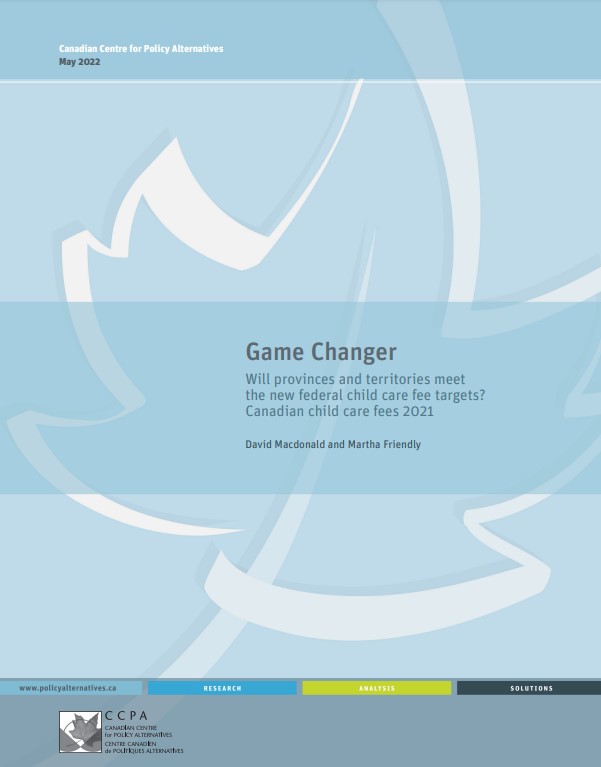EN: Access online
EN: Access full report [PDF]
EN: Access press release online
FR: Accéder au rapport complet [PDF]
FR: Accéder au communiqué de presse en ligne (Forthcoming)
Child care fees on track to drop substantially in 2022 in most big cities, but not all are projected to meet targets: report
OTTAWA—Child care fees Canada-wide are on track to drop quickly for the rest of 2022, but differences in how provinces and territories plan to meet the federal government’s fee reduction targets mean some are not likely to reach them, according to a new report from the Canadian Centre for Policy Alternatives (CCPA).
“We’re well on our way to a solid national child care plan, but the details of implementation matter now more than ever,” says report co-author and CCPA Senior Economist David Macdonald. “In this time of transition, we need to be keeping track of whether targets are being met or not. If they’re not, knowing why will be critical for making corrections.”
The report provides detailed fee data for 37 cities from late 2021, just before major changes in the sector started. It calculates the federal targets for the end of 2022 for each city. Then, based on provincial and territorial child care action plans to date, it projects whether the federal government’s target of a 50 per cent reduction in fees (based on 2019 fees as the baseline) will be met.
For preschool-aged child care (the most common type), seven of 26 cities included in the analysis will meet or exceed their federal targets in 2022. Fifteen will be close, missing their targets by $20 to $100 a month. Four cities will miss their targets for this age group by more than $100 a month: Winnipeg, Calgary, Edmonton and Charlottetown.
“While the move towards affordable parent fees is headed in the right direction in most jurisdictions, the problem of too little licensed child care will get bigger. Meeting the increased demand will require concrete expansion strategies featuring public capital funding and—most importantly—concrete support for under-appreciated early childhood educators, including sufficient pay to retain them, improved working conditions and educational opportunities,” adds Martha Friendly, report co-author and executive director of the Childcare Resource and Research Unit.
The report authors note that the 50 per cent fee reduction is the first concrete step in the multi-year Canada-wide plan to build an affordable, accessible, and high quality child care system, but that system building is expected to take a period of years with multiple linked steps.
The report, based on data collected annually since 2014, is compiled from 11,000 phone calls. It provides median fee calculations for licensed spaces in 37 cities across infant, toddler and preschool-age categories. It is currently the only data source in Canada that provides consistent multi-year tracking of child care fees as charged by providers.
Game Changer: Will provinces and territories meet the new federal child care fee targets? Canadian child care fees 2021 is available for download on the CCPA’s website.
-30-
For interviews contact: Alyssa O’Dell, CCPA media and public relations officer, at 343-998-7575 or media@policyalternatives.ca.
The CCPA is an independent, non-profit charitable research institute founded in 1980.
Press
Child-care fees are on track to drop in some Canadian cities in 2022, says report
The Globe and Mail, 10 May 2022
Some cities will not halve child-care fees by end of year, study finds
CTV News, 10 May 2022
Ottawa wants daycare fees cut in half by end of 2022. Will pricey B.C. reach that target?
The Province, 10 May 2022
Calgary daycare fees for preschoolers likely most expensive in Canada for 2022, report says
CBC News, 10 May 2022
Calgary and Edmonton will miss federal child care fee reduction targets: think tank
Edmonton Journal, 10 May 2022
Calgary Sun, 10 May 2022


